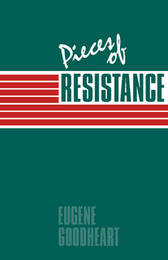
|
Pieces of Resistance
Hardback
Main Details
| Title |
Pieces of Resistance
|
| Authors and Contributors |
By (author) Eugene Goodheart
|
| Physical Properties |
| Format:Hardback | | Pages:212 | | Dimensions(mm): Height 216,Width 140 |
|
| Category/Genre | Literary studies - general |
|---|
| ISBN/Barcode |
9780521340366
|
| Classifications | Dewey:801.950973 |
|---|
| Audience | | Professional & Vocational | |
|---|
|
Publishing Details |
| Publisher |
Cambridge University Press
|
| Imprint |
Cambridge University Press
|
| Publication Date |
25 December 1987 |
| Publication Country |
United Kingdom
|
Description
'Criticism, as I understand and practice it, is evaluative as well as interpretive', writes Eugene Goodheart. Pieces of Resistance is a collection of Goodheart's essays and reviews written between 1960 and 1985. The book responds to the political, cultural, and literary changes expressed during this period by novelists, critics, and journalists. Goodheart's exemplary figures include Lionel Trilling, Philip Rahv, and V. S. Naipaul: writers he believes share a particular sensitivity to literary and cultural ideologies that distort and diminish our understanding of the world. Goodheart's book is divided into three parts. The first section discusses critics Trilling, Rahv, Leslie Fiedler, Geoffrey Hartman, David Bleich, and Susan Sontag--to name a few. The second part devotes itself to contemporary culture and includes essays on journals such as The New York Review of Books, Commentary, and The Evergreen Review, which in the 1960s and early 1970s provided a well-lit playground for various political, cultural, and literary themes. Finally, Goodheart examines the work of many modern writers with essays on Isaac Bashevis Singer, Daniel Fuchs, Ralph Ellison, Nadine Gordimer, V. S. Naipaul, Bernard Malamud, William Styron, Donald Barthelme, Raymond Carver, and Saul Bellow. Goodheart does not pretend to impersonal objectivity; his commitment to evaluative criticism--seeing a text in its relationship to political and cultural movements - is a deliberate response to current, increasingly specialized forms of criticism.
|